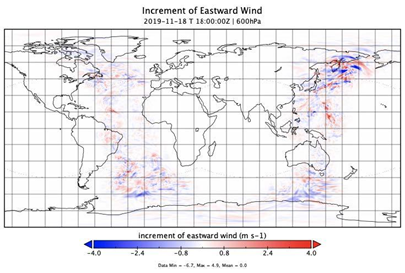As climate change concerns continue to rise, innovative advancements to how new and existing Earth-observing systems utilize available data are necessary for maximum impact. The Joint Effort for Data assimilation Integration (JEDI) system changes the paradigm within partnering organization modeling efforts through the utilization of agile methodologies and tools that effectively address traditional and evolving challenges posed to the field of data assimilation. JEDI is a community effort developed and distributed by the Joint Center for Satellite Data Assimilation (JCSDA), a multi-agency research center uniting NOAA, NASA, US Navy and Air Force, with its operations hosted by the University Corporation for Atmospheric Research (UCAR). The JCSDA is pleased to announce the first public, open-source release of JEDI on October 28, 2020. The JEDI code repository may be found here.
In addition to a strong emphasis on community development, the JEDI system boasts several unique features that set it apart from previous data assimilation frameworks. Evolving from the Object Oriented Prediction System (OOPS), JEDI infrastructure allows for versatile use of multiple data assimilation algorithms. JEDI is designed to interface with all components of the Earth system while allowing for a variety of applications. The JEDI software package included with this JEDI-FV3 release 1.0 can run on several different platforms, from laptops to supercomputers, to readily accommodate new models and new observing systems.
The JEDI-FV3 release 1.0 will contain everything needed to emulate JCSDA’s near-real-time monitoring application, which will act as a showroom of the latest JEDI capabilities following a continuous integration and delivery approach. This release includes interfaces for processing a wide variety of observational data and a library of observation operators for conventional, satellite radiance and GNSS radio-occultation measurements that can be run from both FV3-based GFS and GEOS models. The release will also unveil core JEDI components such as high-level variational and hybrid DA algorithms, and generic utilities for handling background error covariance matrices.
The JEDI-FV3 release 1.0 package will contain the following:
- Source code, run scripts, and configuration files on publicly accessible JCSDA Github repository under open-source license.
- A container equipped with the environment to easily pull from GitHub and build executables, together with all the data needed to run the observation operators for a single pre-canned “golden day”. Forecast models available for DA applications include FV3-GFS and FV3-GEOS.
- The release documentation will include examples and a self-paced online tutorial posted on the JCSDA website. More comprehensive tutorials addressing specific features and use cases will be added in the weeks following the release.
This release is only the first in a succession of impressive feature releases. According to Yannick Trémolet, JEDI Project Lead, “This is the first release of the JEDI system, configured for operational atmospheric models. We are looking forward to the many opportunities for uses and contributions from the community. Upcoming releases will make full use of the generic structure of the system to bring new applications for several Earth-system components, yielding unique capabilities to the community in a modern, flexible and open structure.” To be notified of features added in subsequent releases (e.g. stand-alone unified forward operator, WRF, MPAS, toy models, marine DA), subscribe to the JCSDA News mailing list for release updates, bug fixes, and new release announcements.
From the inception of this highly ambitious project, an initial public release of JEDI has been highly anticipated. Through the work of a dedicated team and community support, the JCSDA is pleased to provide a state-of-the-art data assimilation system that will continue to positively impact our partners as well as the scientific, academic, and private sector communities.
The JEDI Academies
JEDI Academies are training opportunities offered by the JCSDA where members of the scientific community can learn how to utilize JEDI through lectures and practicums delivered by core JEDI developers. The 5th JEDI Academy will be held virtually via Zoom on November 16-20, 2020. Virtual lecture sessions will involve pre-recorded presentations and interactive Q&A. The practical sessions will take advantage of the JEDI-FV3 1.0 public release and they are capped at 40 applicants. Preference will be given to community members who demonstrate early and frequent involvement on JCSDA GitHub (e.g. code reviews) and forums. Selected participants for practical sessions will be notified via email. Please apply here by November 4, 2020.






